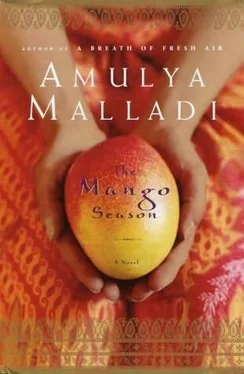I MISS YOU. I MISS YOU VERY MUCH.
AND YES, TELL JIM AND CINDY THAT WE’D LOVE TO GO CAMPING. I GUESS ONCE I’M BACK I’LL BE READY FOR A VACATION.
I’LL TRY AND CALL AGAIN, BUT IT COULD BE TRICKY. I CAN CERTAINLY SEND EMAIL. MA DOESN’T UNDERSTAND COMPUTERS SO SHE’LL NOT SNOOP AROUND NATE’S COMPUTER AND HE’LL DEFINITELY CHEW HER OUT IF SHE TRIES.
I LOVE YOU,
PRIYA
I went downstairs and found my mother lying haphazardly on the couch, snoring harshly. Her thin hair, which had been through repeated bad dye jobs, lay lifelessly against the maroon fabric of the sofa. Her lumpy stomach went up and down and I could see the flesh at her midriff spill each time she breathed out. I never understood why Indian women wore saris in this day and age when alternatives like salwar kameez would not be frowned upon. A sari was uncomfortable, and the midriff-the area where most of the battles of the bulge were fought and lost-stood exposed like an unraveled guilty secret.
I looked at my wristwatch and frowned. She had made me hurry up but had fallen asleep herself.
“Ma,” I called out. She stirred a little, so I called out again and this time her eyes opened. They were bloodshot and she looked at me, slightly disoriented. Her gaze then fell on the clock. She sat up groggily.
“Go and get an auto,” she told me, then stood up yawning and stretching. “And not one paisa more than fifteen rupees. Tell the auto rickshawwallah that and if he does any kitch-kitch, I will deal with him.”
I slipped on my sunglasses, took my purse, and went through rows of houses to reach the main road. A buffalo strolled on the newly laid asphalt street and I tiptoed around it in fear. I was always afraid of stray animals on the road. The fear of buffaloes was deep-rooted, probably embossed onto my consciousness because of a “bad childhood experience” as the shrinks in all the movies say about serial killers. According to my father (my mother tells a slightly different version of the same story), when I was just seven months old we went to visit some relatives in Kavali, a small town in the same state as Hyderabad. My mother left me in the open veranda on a straw mat, while she went inside the house for something or the other. All of a sudden a buffalo came charging through the street, inside the gate, and onto the veranda. By the time my mother called out and my father came rushing outside, the buffalo was towering over me, sharp horns pointed toward me, a leaky snout dropping mucus close to where I lay unaware of the perilous situation I was in.
“God knows why, but the bull went away, though for a while we thought it would hurt you,” my father said.
My mother’s version of the story was mostly the same as my father’s, only in her story it was my father who had left me on the veranda, not she. “I never left any of my children anywhere without supervision. It is your father… always wants this and that and leaves children where they are without any thought,” she explained.
I reached the main road and found an auto rickshaw. The driver was smoking a bidi, lounging on the vinyl-covered seat of his three-wheeler, while a small radio at his feet was playing the latest hit song from a Telugu film. “Come and take me in your arms, come and take me and make me yours. You are gone I know but I wait you know, for you to come and make me yours,” a female voice sang to an oft-used melody.
“Himayatnagar,” I said loudly to be heard over the song, and the auto rickshaw guy nodded and turned the radio off just as a woman’s heartbroken voice begged her lover yet again not to leave.
“Chalis rupya,” he said, and I shook my head. I hated to barter, but even I knew forty rupees was too much.
“Thees,” I countered, holding up three fingers, and he agreed without any resistance, which underscored the point that forty rupees was too much and probably even thirty was excessive, but I didn’t have the stomach to go on.
I pulled out fifteen rupees from my purse and gave it to him. “I will give this to you now and my mother will give you another fifteen,” I told him and he looked at me quizzically. I got into the rickshaw and asked him to drive to my parents’ house. “And don’t tell my mother that the price is thirty, just fifteen. Accha?”
The auto rickshaw driver winked at me. “Take it easy, Amma, apun can keep secret,” he said as he hitched his pants up to his knees and started the scooter of the auto. “Vroom-vroom… to your castle, hain?”
I gave the man directions and he drove, chuckling to himself. When we reached the gate of my parents’ house, I asked him to wait while I went to get my mother. The rickshawwallah didn’t listen to me and even before I had set foot on the road, he honked three times, loudly enough to wake up the dead.
Ma came out of the house hurriedly, responding to the honks, wearing a red and yellow cotton sari, and my eyes took time to adjust to the bright colors. I didn’t like knowing that I had to adjust to India -it was absurd. I was Indian, yet everything seemed only vaguely familiar. I couldn’t remember how I used to feel when my mother wore a sari that made her look like a large Tequila Sunrise.
With the help of the auto rickshaw driver we put the twenty kilos of raw mangoes in the auto rickshaw. Ma and I squeezed on the slightly torn brown vinyl seat with difficulty, our legs hanging limply on the side of the large straw basket. I put a cotton bag with a change of clothes between us, along with a bag of gifts I brought for the family, and got ready for a bumpy and uncomfortable ride.
“Now, if Ammamma wants to give you something, just take it, okay? ” Ma told me. “But if she gives you something very expensive, like jewelry, then,”-she paused and shrugged-“ask me if you can take it.”
“And what’ll you say?”
“I will ask you to take it,” Ma told me irritably. “But that doesn’t mean you have to take it right away. Nothing wrong in showing some reluctance.”
Familial politics always made me want to be without family. I never understood the intricacies. It was like facing a complex math problem that had numerous ways to solve it and you didn’t know which one was the right way because the answer to the problem changed randomly. When was it right to look reluctant and when was it right to look eager? I didn’t have a clue seven years ago and I was not any wiser now.
“And if anyone asks you about marriage, just ask them to talk to me,” she further instructed.
My marriage, but she wants to talk to them, whoever they were-typical Ma. “And what will you tell them?” I asked patiently.
“If they have a good U.S. boy in mind and he is in India on leave like you, we can probably arrange something,” she explained. “If it works out, you will be married and happy. It will be a load off my chest. An unmarried daughter… What must the neighbors think?”
I glared at my mother. She was holding tightly to an iron handle on her side of the auto rickshaw and her naked potbelly heaved through her sari’s pallu as the auto rickshaw went through bad roads and worse roads.
There was this misconception my mother refused to discard. According to her, a woman was happy only if she was married. She had not once asked me if I was happy now. The question was moot; how could I be happy if I wasn’t married?
I wanted to lash out, tell her that I was getting married very soon, but I knew now was hardly the time. Maybe at dinner, I told myself nervously. Dinner would be a good time. Everyone would be there and we would be spending the night at my grandma’s house. There would be safety in numbers.
“If anyone tells you that you are too old to be unmarried”- my mother paused dramatically-“it is your fault.”
If I expected Ma to be compassionate, I was living in a fool’s paradise. And I was anything but a fool.
Читать дальше











